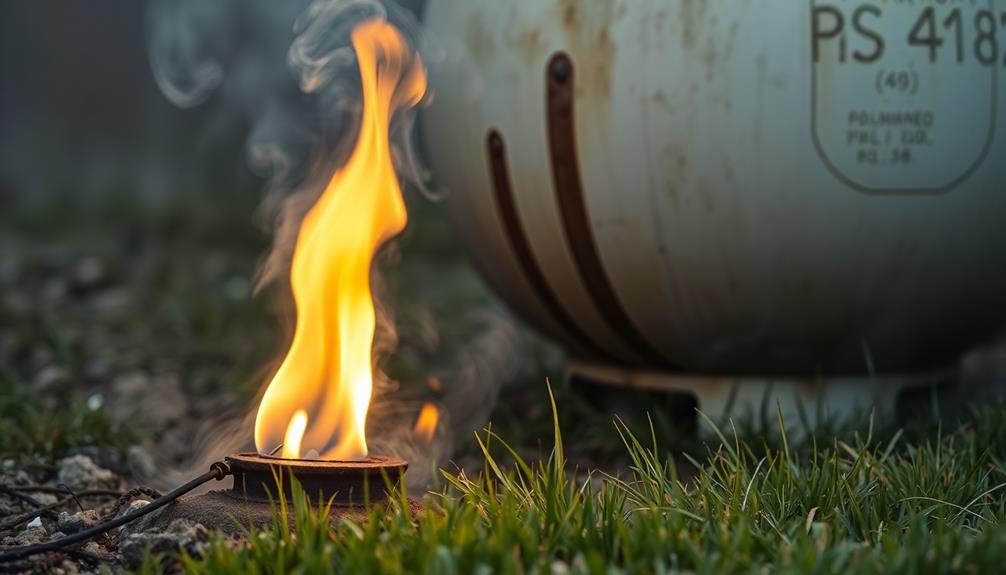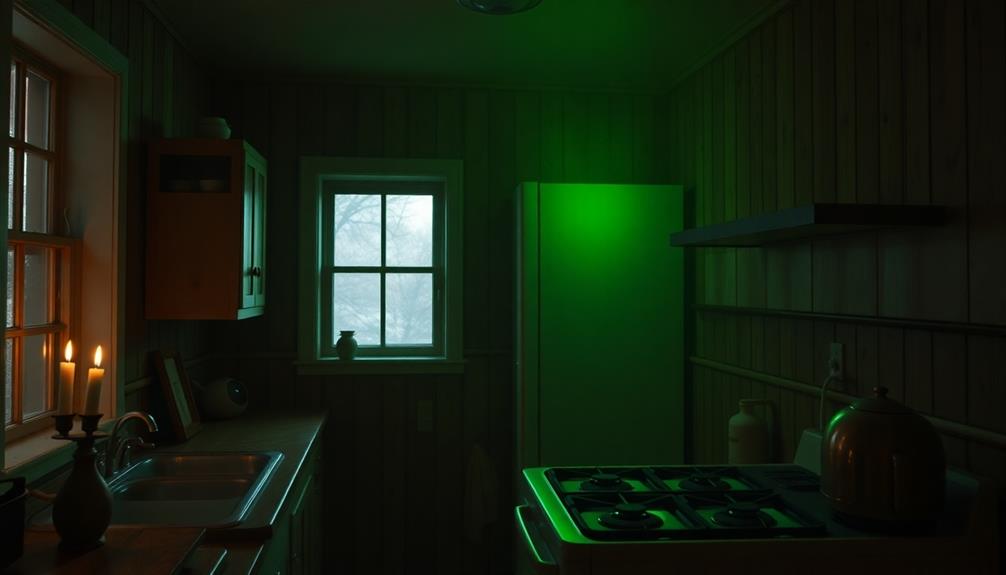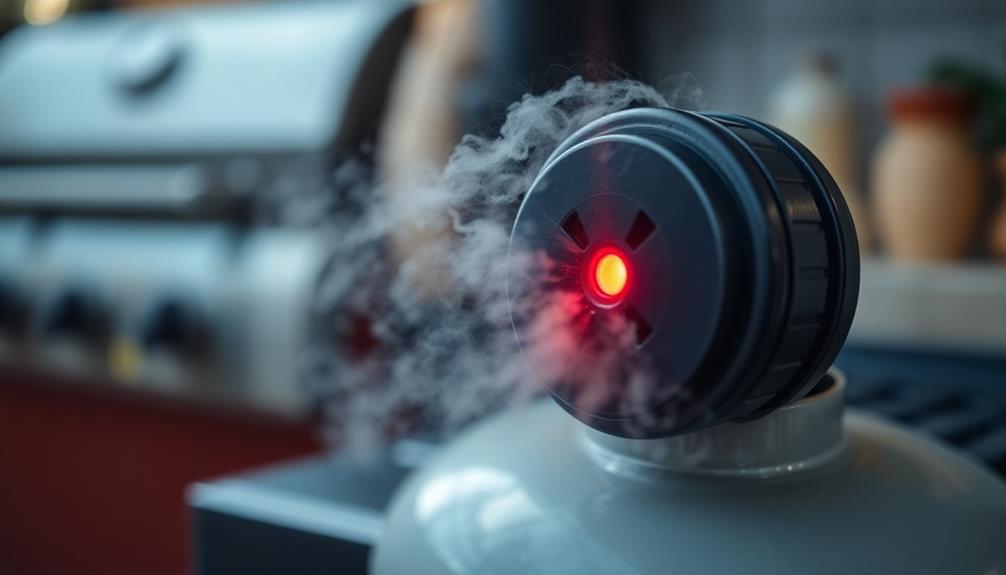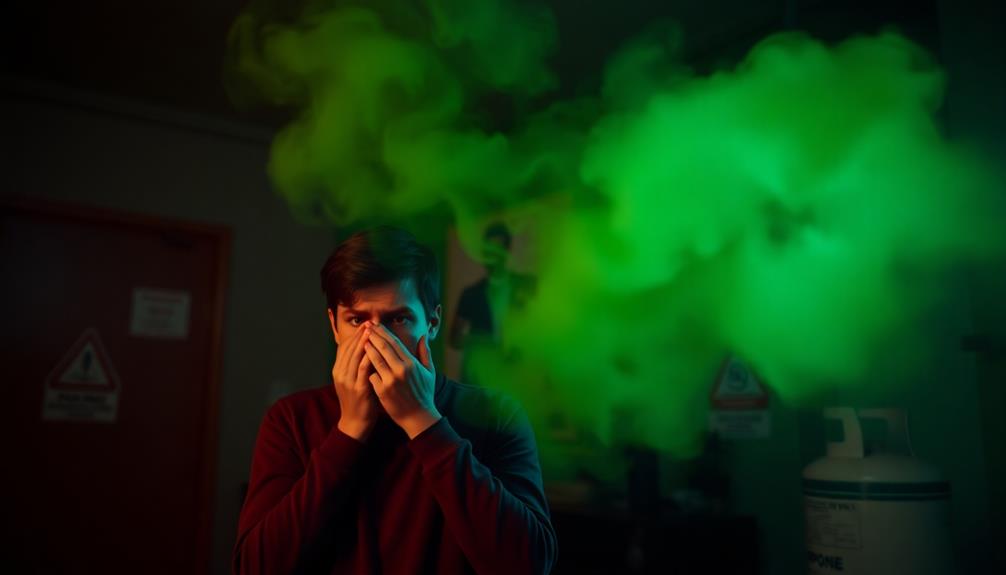If you notice a strong smell that reminds you of rotten eggs or skunk spray, it's likely a propane leak. Propane itself is odorless, but a safety agent called ethyl mercaptan is added to give it that distinct odor. This smell is your warning system, so don't ignore it! If you detect any propane odor, it's important to act quickly—leave the area and ensure good ventilation. Even faint smells can be significant, so trust your instincts. Want to discover more tips about propane safety and what to do next? There's plenty to explore!
Key Takeaways
- Propane is odorless, but ethyl mercaptan is added, giving it a strong smell similar to rotten eggs or sulfur.
- A noticeable propane smell indicates a possible gas leak, requiring immediate action.
- Cooking or other strong odors can mask the smell of propane, making vigilance essential.
- Factors like age, medical conditions, or colds may impair smell detection; gas detectors are recommended.
- Even faint or fading odors should be taken seriously, as they could signal a leak.
Introduction

When it comes to propane, understanding its smell is crucial for your safety. You mightn't know this, but propane is naturally odorless. To keep you safe, manufacturers add a special odorant called ethyl mercaptan, which gives it a distinct smell that's often compared to rotten eggs or skunk spray.
This strong, unpleasant propane smell acts as a warning system, alerting you to potential propane leaks in your home or business.
Being familiar with this odor is super important. Even a faint smell can signal a leak that needs immediate action. If you ever catch a whiff of that odor similar to rotten eggs, it's best to take it seriously. You should evacuate the area and call a professional to check for propane leaks.
Description of the Smell

The smell of propane, introduced through the added ethyl mercaptan, is unmistakable. You might notice it has a strong, unpleasant odor that resembles the smell of rotten eggs or even skunk spray. This distinct scent is a safety feature, making it easier for you to detect a leak.
If you ever catch a whiff of this odor, it's essential to take it seriously. A noticeable smell means there could be a propane leak, and you should act quickly.
Sometimes, a faint mercaptan smell may linger after you use propane appliances. If that happens, don't ignore it! Respond promptly to any noticeable odor, even if it seems mild. Getting familiar with the smell of propane is crucial for your safety.
Remember, not all gas leaks will produce a detectable odor, so being aware is key.
If you ever smell ethyl mercaptan, leave the area immediately and contact your propane supplier or emergency services. Your safety is the most important thing, so trust your nose and take action when you detect that unmistakable smell!
Source and Composition

Propane's source and composition play a crucial role in its safety and usability. Propane gas is naturally colorless and odorless, which makes it hard to detect leaks without help. To keep you safe, a substance called ethyl mercaptan is added to propane. This odorant gives propane that unmistakable smell, often described as rotten eggs or sulfur, alerting you to any potential leaks.
The strong, unpleasant odor from mercaptan is your first line of defense. It's designed to grab your attention quickly. However, be cautious! Other strong smells, like cooking or tobacco smoke, can mask this odor, making it harder for you to detect a leak.
Also, keep in mind that some factors can affect your ability to smell propane. Age, certain medical conditions, and prolonged exposure to the odor can lead to something called odor fatigue. This means you mightn't notice the smell as easily.
Always stay alert and make sure your space is well-ventilated. If you ever suspect a leak, leave the area immediately and contact a professional for help. Your safety is the priority!
Typical Scenarios or Environments

Detecting a propane leak can happen in various scenarios, each presenting unique challenges.
In residential areas, if you smell a strong propane odor that resembles rotten eggs, it's crucial to act quickly. This scent comes from ethyl mercaptan, which is added to propane for safety. If you smell it near propane appliances, don't ignore it!
Outdoor settings can be tricky too. If you're near propane tanks or appliances and notice that same distinctive smell, you might be facing a gas leak that needs immediate attention.
In commercial kitchens, however, strong food aromas can mask the propane odor, so stay alert for any unusual scents while cooking.
Industrial environments have their own signs; you may detect a noticeable propane odor along with hissing sounds, which clearly indicate a leak.
Remember, environmental factors like wind or ventilation can affect how strongly you smell propane. So, always trust your nose. If you think there's a leak, evacuate the area and call for help without delay.
Being aware of these typical scenarios will keep you and those around you safe!
Emotional or Cultural Associations

Smelling propane can trigger immediate feelings of fear and urgency for many people. The distinct gas smell, often likened to rotten eggs, brings to mind potential danger and the need for quick action. This reaction is deeply rooted in our cultural understanding of propane safety. In some communities, families teach children about the smell as a cautionary tale, helping them recognize it early on.
In many homes, the scent of propane can spark anxiety or panic. That's why being familiar with its odor is so important. When you know what propane smells like, you're better prepared to respond quickly if there's a leak. This vigilance isn't just personal; it helps build a safer community where everyone understands the signs of danger.
Unfortunately, the added odor of propane can carry a bit of stigma too. In movies and shows, the gas smell is often used to signal disaster or emergencies, reinforcing our fears. However, knowing how to react and being aware of propane safety can turn those feelings of dread into proactive measures.
In case of a leak, don't hesitate to contact emergency services right away.
Health or Safety Considerations

When you sense the distinctive odor of propane, it's crucial to act swiftly, as this gas poses serious health and safety risks. Propane is odorless by nature, but an added substance gives it that rotten egg smell. This helps you detect leaks.
However, conditions like colds or allergies can make it hard for you to notice the smell of propane. That's why having propane gas detectors in your home is a smart idea—they can alert you even if your nose can't.
Strong odors from cooking or smoke can hide the smell of propane, so you can't just rely on your sense of smell. If you ever catch a whiff of propane, don't wait! Evacuate the area immediately, because propane is highly flammable and can be dangerous.
Regular maintenance of your propane system is also essential. Check for leaks and make sure everything works properly.
Following these safety tips, like installing gas detectors and keeping your area well-ventilated, can greatly reduce risks. Stay alert and prioritize safety to keep yourself and your loved ones protected!
Final Thoughts

Understanding the importance of recognizing propane leaks can significantly enhance your safety and that of your loved ones.
Propane smells like rotten eggs or skunk spray, thanks to the added odorant ethyl mercaptan. It's vital to be familiar with this propane leak smell because quick detection can help you respond promptly to any danger.
Remember, some factors can affect your ability to smell propane, like colds or allergies. This means you should always take any detectable smell seriously.
Odor fade can also happen, so even if the smell is faint, don't ignore it.
To boost your safety, consider regular maintenance of your propane appliances.
Installing propane leak detectors is a smart move, as they can alert you to leaks even if you can't smell them.
Frequently Asked Questions
How Do You Tell if You Have a Propane Leak?
To tell if you've got a propane leak, stay alert for any strange odors, listen for hissing sounds near appliances, and watch for dead vegetation. If you notice any signs, evacuate immediately and call for help.
What Would a Propane Leak Smell Like?
If you're ever near a propane leak, you'll likely notice a strong, unpleasant smell. It's often compared to rotten eggs or skunk spray. Recognizing this odor quickly is vital for your safety. This distinct odor is caused by an additive called mercaptan, which is mixed with propane (and natural gas) to help people detect leaks. It’s important to know that propane itself is odorless, so without this additive, you wouldn’t be able to smell it at all. If you’re wondering what a natural gas leak smells like, it’s very similar—thanks to the same mercaptan additive, which gives it that recognizable sulfur-like scent.
Can a Propane Leak Make You Sick?
Yes, a propane leak can make you sick. You might experience symptoms like dizziness, headaches, or nausea. If you notice these signs, evacuate immediately and seek medical attention to ensure your safety.
Does a Propane Leak Smell Like a Dead Mouse?
No, a propane leak doesn't smell like a dead mouse. Instead, it has a strong, distinctive odor resembling rotten eggs. Recognizing this unique smell is crucial for your safety in identifying potential leaks.









